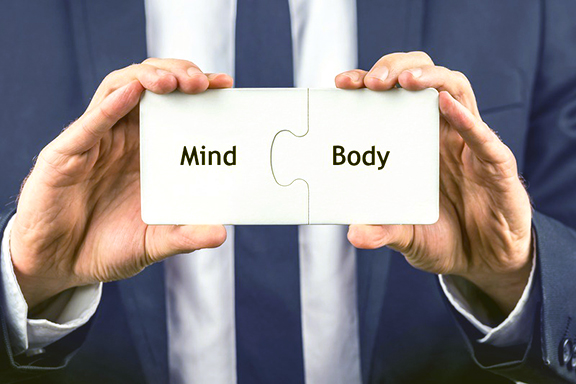The Mind-Muscle Connection
Body is mind and mind is body. To some they are considered one and the same. I amongst many other fitness professionals happen to believe that the mind-body connection is one of the most important aspects of training. You simply cannot achieve success and a better level of physical conditioning without a functional harmonious relationship between the two.
We’ve all heard the motto “mind over matter.” Did you know that it can help you get the most out of your workouts? Many fitness professionals believe that by thinking about your muscles moving your body through an exercise, you can help them work more effectively and efficiently. So in theory, if you focus on the muscles that you’re working, you will get better results.

Body is mind and mind is body. To some they are considered one and the same. You simply cannot achieve success and a better level of physical conditioning without a functional harmonious relationship between the two.
Though many of us think of exercise as a form of physical training, it’s actually very much a mental discipline. It’s all about training the mind to use the body in a progressive and more productive way. Once we’ve mastered this, we will have the ability to excel in all realms of training.
Did you know that everything your muscles do or don’t do in regards to regulating muscle movement and strength depends on the instructions it receives from your brain? The mind, or your brain, is connected to your spinal cord which then branches out into your peripheral nervous system through all of the nerves in your body. These nerves are then attached to your muscles which respond to the signals they receive from your brain. So basically, muscles are a puppet of the nervous system and a muscle that does not have nerves regulating it is essentially useless in terms of force production.
Remarkably, the brain can regulate strength without you ever moving a single muscle. The theory is that if you visualize an exercise and specific muscle movement as you do it, you can train the brain to send stronger signals. This translates to more muscle engagement, likely by either recruiting more muscle fibers or getting the fibers to work quicker and more efficiently. I see it like this. There’s no harm that can come out of it, so why not give it a try!
Here’s another way to look at it. If you’re actively focusing on the muscles you’re trying to engage during an exercise, you’ll have better form. Better form will lead to better results. Who wouldn’t want more out of their gym time! So the next time you’re doing a bicep curl, imagine the bicep muscle contracting and lengthening as you lift the weight up and down. It can’t hurt, right?
Think about this for a minute. When you focus on the muscles that you’re using, you become more in tune with what your body is doing. When you’re at the gym, you can easily tell who is focused on an exercise they’re doing and who is not. You see a tremendous difference in performance. They’re in the zone! It’s kind of like a form of meditation.

Many of us think of exercise as a form of physical training, it’s actually very much a mental discipline. It’s all about training the mind to use the body in a progressive and more productive way.
There is a simple technique I use with some of my clients during our sessions to improve their mind-muscle connection. I have them get their body in the optimal position for an exercise. For instance, when doing a plank they would position their elbows, feet, and head where they need to be.
Once they’re in the correct position I have them tense up all of the muscles I want them to engage throughout the exercise. Believe it or not, most of us are used to tensing up our muscles in reaction to the resistance of an exercise. By learning to actively tense the muscles, they will have better control over where the tension is in their body and their workout will be much more effective.
Once all of this is understood and practiced, I have them then apply the resistance of the exercise. When doing a plank this means pushing their body just off the floor with the elbows so gravity is pulling down on the whole body. When this happens the tension of the exercise already flows through the muscles in much the same way it would have prior to applying the resistance. Now they can work the muscles more effectively and efficiently.
In Conclusion:
In the end, everything you want to accomplish in your training comes down to how you use your muscles and everything about using your muscles comes down to how your mind relates to and can use them. Your muscles will do whatever your mind tells it to do. It’s training the mind that’s the hard part.

Remember that fitness of mind and body belong together, and that exercise is very narrowly defined in our society. So redefine exercise as any activity that reduces stress and connects your mind and body.
Are you ready to put the mind-muscle connection into practice? A mental workout doesn’t top an actual workout, but it definitely has its benefits! It doesn’t take any extra time or physical effort to simply channel your thoughts, so you have nothing to lose and only potential strength to gain.
Remember that fitness of mind and body belong together, and that exercise is very narrowly defined in our society. So redefine exercise as any activity that reduces stress and connects your mind and body. You’ll be more likely to continue your exercise plan and achieve the success you’re looking for. Good luck to you!
I have been a personal trainer for over seventeen years and I absolutely love what I do. I honestly feel that I have one of the best jobs out there! The most rewarding part of my profession is helping one of my clients succeed at reaching their personal fitness goals. Making a difference in someone’s life makes it all worthwhile. I am currently certified by the National Sports Conditioning Association, Apex Fitness Group, and the International Sports Science Association.










